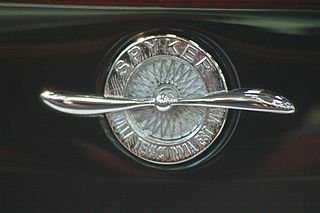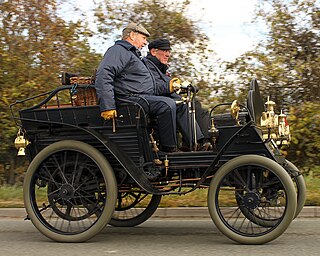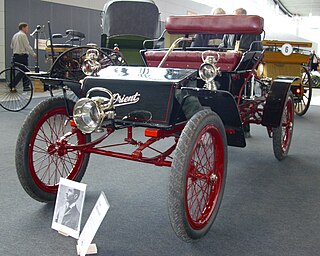
Buick is a division of the American automobile manufacturer General Motors (GM). Started by automotive pioneer David Dunbar Buick, it was among the first American marques of automobiles, and was the company that established General Motors in 1908. Before the establishment of General Motors, GM founder William C. Durant had served as Buick's general manager and major investor.

The Cadillac Motor Car Division is a division of the American automobile manufacturer General Motors Company (GM) that designs and builds luxury vehicles. Its major markets are the United States, Canada, and China. Cadillac models are distributed in 34 additional markets worldwide. Cadillac automobiles are at the top of the luxury field within the United States. In 2019, Cadillac sold 390,458 vehicles worldwide, a record for the brand.

Spyker or Spijker was a Dutch carriage, automobile and aircraft manufacturer, started in 1880 by blacksmiths Jacobus and Hendrik-Jan Spijker. Originally located in Hilversum, the company relocated to Trompenburg, Amsterdam in 1898.
The Locomobile Company of America was a pioneering American automobile manufacturer founded in 1899, and known for its dedication to precision before the assembly-line era. It was one of the earliest car manufacturers in the advent of the automobile age. For the first two years after its founding, the company was located in Watertown, Massachusetts. Production was transferred to Bridgeport, Connecticut, in 1900, where it remained until the company's demise in 1929. The company manufactured affordable, small steam cars until 1903, when production switched entirely to internal combustion-powered luxury automobiles. Locomobile was taken over in 1922 by Durant Motors and eventually went out of business in 1929. All cars ever produced by the original company were always sold under the brand name Locomobile.

The Austin Motor Company Limited was a British manufacturer of motor vehicles, founded in 1905 by Herbert Austin. In 1952 it was merged with Morris Motors Limited in the new holding company British Motor Corporation (BMC) Limited, keeping its separate identity. The marque Austin was used until 1987. The trademark is currently owned by the Chinese firm SAIC Motor, after being transferred from bankrupt subsidiary Nanjing Automotive which had acquired it with MG Rover Group in July 2005.

Marmon Motor Car Company was an American automobile manufacturer founded by Howard Carpenter Marmon and owned by Nordyke Marmon & Company of Indianapolis, Indiana, US. It was established in 1851 and was merged and renamed in 1933. They produced cars under the Marmon brand. It was succeeded by Marmon-Herrington and later the Marmon Motor Company of Denton, Texas. The name currently survives through the Marmon Group of Chicago.

Front-wheel drive (FWD) is a form of engine and transmission layout used in motor vehicles, where the engine drives the front wheels only. Most modern front-wheel-drive vehicles feature a transverse engine, rather than the conventional longitudinal engine arrangement generally found in rear-wheel-drive and four-wheel drive vehicles.

NSU Motorenwerke AG, or NSU, was a German manufacturer of automobiles, motorcycles and pedal cycles, founded in 1873. Acquired by Volkswagen Group in 1969, VW merged NSU with Auto Union, creating Audi NSU Auto Union AG, ultimately Audi. The name NSU originated as an abbreviation of "Neckarsulm", the city where NSU was located.

L'Aster, Aster, Ateliers de Construction Mecanique l'Aster, was a French manufacturer of automobiles and the leading supplier of engines to other manufacturers from the late 1890s until circa 1910/12. Although primarily known as an engine mass manufacturer the company also produced chassis for coach-works and a complete range of components.

De Dion-Bouton was a French automobile manufacturer and railcar manufacturer operating from 1883 to 1953. The company was founded by the Marquis Jules-Albert de Dion, Georges Bouton, and Bouton's brother-in-law Charles Trépardoux.

Sunbeam Motor Car Company Limited was a British motor car manufacturer with its works at Moorfields in Blakenhall, a suburb of Wolverhampton in Staffordshire, now West Midlands. Its Sunbeam name had been registered by John Marston in 1888 for his bicycle manufacturing business. Sunbeam motor car manufacture began in 1901. The motor business was sold to a newly incorporated Sunbeam Motor Car Company Limited in 1905 to separate it from Marston's pedal bicycle business; Sunbeam motorcycles were not made until 1912.

Singer Motors Limited was a British motor vehicle manufacturing business, originally a bicycle manufacturer founded as Singer & Co by George Singer, in 1874 in Coventry, England. Singer & Co's bicycle manufacture continued. From 1901 George Singer's Singer Motor Co made cars and commercial vehicles.

Wolseley Motors Limited was a British motor vehicle manufacturer founded in early 1901 by the Vickers armaments combine in conjunction with Herbert Austin. It initially made a full range, topped by large luxury cars, and dominated the market in the Edwardian era. The Vickers brothers died and, without their guidance, Wolseley expanded rapidly after the war, manufacturing 12,000 cars in 1921, and remained the biggest motor manufacturer in Britain.
Bufori is a brand of hand-built automobiles inspired by American 1930s coupes. The company is owned by three Australian Lebanese brothers Anthony, George and Gerry Khouri. In 1986, Gerry Khouri began to build three special sports cars in his garage, one each for the three brothers, which led to the formation of the company. The name Bufori is an acronym that stands for B – Beautiful, U – Unique, F – Funtastic, O – Original, R – Romantic, I – Irresistible.

Elmore Manufacturing Company was a manufacturer of veteran and brass era automobiles and bicycles (1893–97), headquartered at 504 Amanda Street, Clyde, Ohio, from 1893 until 1912. The company took its name from a small parcel of land in Clyde with the name Elmore associated with it where a stave mill was established originally, then evolved into bicycle production. The village of Elmore, Ohio is located 20 mi (32.2 km) to the east. Founded by Harmon Von Vechten Becker and his two sons, James and Burton, the Elmore used a two-stroke engine design, in straight twin or single-cylinder versions. They later produced a straight-3 followed by a straight-4 beginning in 1906 until production ended in 1912. The company advertising slogan was "The Car That Has No Valves", referring to the two-stroke engine.

The Mors automobile factory was an early French car manufacturer. It was one of the first to take part in automobile racing, beginning in 1897, due to the belief of the company founder, Émile Mors, in racing's technical and promotional benefits. By the turn of the century, automobile racing had become largely a contest between Mors and Panhard et Levassor.

Waltham Manufacturing Company (WMC) was a manufacturer of bicycles, motorcycles, motorized tricycles and quadricycles, buckboards, and automobiles in Waltham, Massachusetts. It sold products under the brand names Orient, Waltham, and Waltham-Orient. The company was founded in 1893, moving to self-propelled vehicles after 1898.

Daimler-Motoren-Gesellschaft was a German engineering company and later automobile manufacturer, in operation from 1890 until 1926. Founded by Gottlieb Daimler and Wilhelm Maybach, it was based first in Cannstatt. Daimler died in 1900, and their business moved in 1903 to Stuttgart-Untertürkheim after the original factory was destroyed by fire, and again to Berlin in 1922. Other factories were located in Marienfelde and Sindelfingen.

The Premier Motor Manufacturing Company was organized in 1903 by George A. Weidely and Harold O. Smith in Indianapolis, Indiana. The company built automobiles with air-cooled engines.

The Caldwell Vale Truck & Bus Co. was an Australian automobile, bus, truck and tractor manufacturer from 1907 to 1913 in the Sydney suburb of Auburn. The company started in 1907 when Felix Caldwell and Norman Laurie Caldwell of South Australia filed for a patent covering "Improvements in and connected with driving and steering motor propelled vehicles". In short, the patent was for a four-wheel-drive system with four-wheel-steering. Later they combined with Henry Vale of New South Wales and in 1910, the trio applied for a patent covering "Improved power steering gear for heavy motor driven road vehicles". Few technical details have survived about the marque and roughly 40 examples of the vehicles appear to have been made. A touring car, it is known to have had four-wheel drive, a 30 hp six-cylinder engine and four-wheel steering. The company also built a fair tractors. In 1912–13, the company lost a court case to do with the performance guarantee of the trucks and was taken over by Purcell Engineering in 1916.